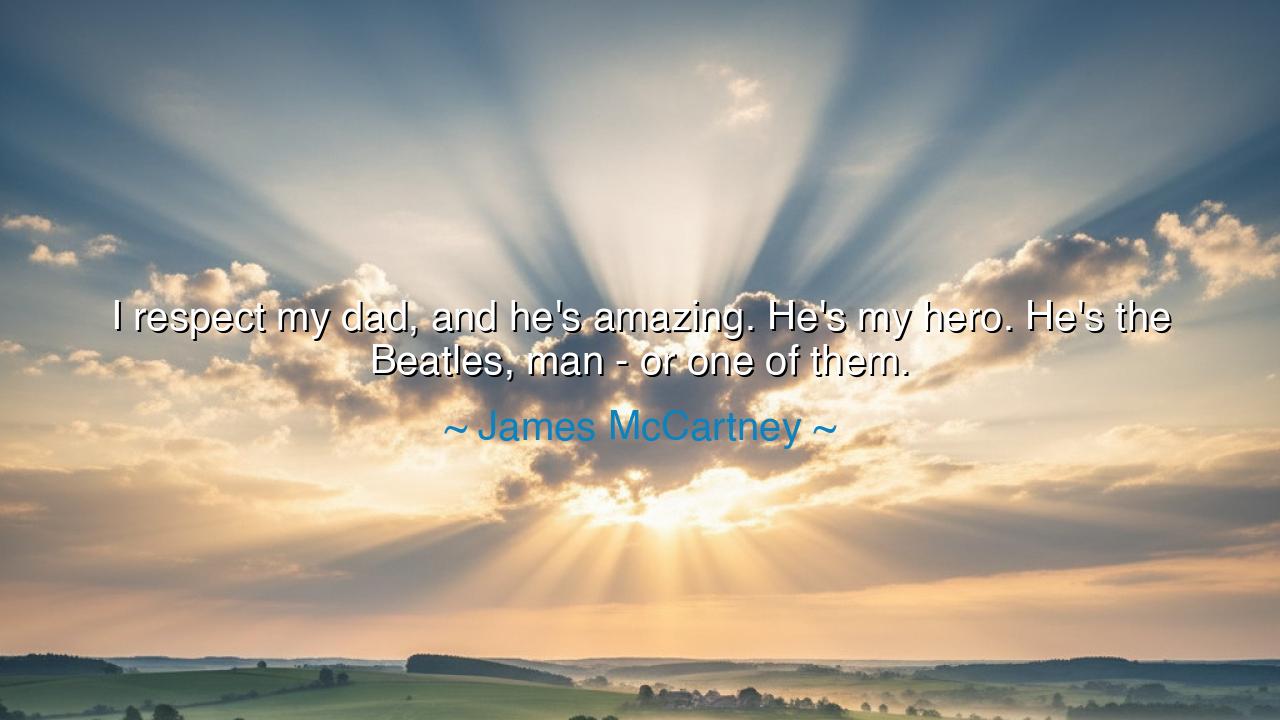
I respect my dad, and he's amazing. He's my hero. He's the
I respect my dad, and he's amazing. He's my hero. He's the Beatles, man - or one of them.






When James McCartney said, “I respect my dad, and he’s amazing. He’s my hero. He’s the Beatles, man — or one of them,” he spoke not just as a son, but as a soul standing in awe of both legacy and love. His words carry the weight of two great inheritances — the personal and the universal. To him, Paul McCartney is not only the father who raised him, but also a pillar of modern music, a legend whose melodies shaped the dreams of generations. In this simple yet profound confession, James reveals a timeless truth: that to revere one’s parent is to honor both the person and the myth, the mortal and the immortal. For when a child sees greatness in a parent, and yet loves them for their humanity, it is a form of sacred balance — the harmony between admiration and affection.
The origin of this quote lies in the unique position James McCartney occupies — the son of one of the most celebrated musicians in history. To the world, Paul McCartney is a symbol of creativity, a voice of peace, and a composer of eternal songs. But to James, he is also “Dad” — the man behind the fame, the father who guided, supported, and inspired him. This duality — of fame and fatherhood — gives his words their emotional power. They echo the eternal tension between the public and the personal, between legacy and intimacy. For even in the shadow of greatness, the heart still seeks its most familiar light: the love and approval of one’s parent.
To call his father his “hero” is to express something ancient — the child’s instinctive desire to look upward and find a model of strength and virtue. In every culture, from the myths of Greece to the legends of the East, the father figure stands as both guide and guardian, a symbol of protection and wisdom. Yet when James adds, “He’s the Beatles, man — or one of them,” he bridges the mythic with the mundane, the divine with the human. He acknowledges that his father’s greatness belongs not only to him but to the world. This is the humility of a son who knows that love does not compete with legacy — it complements it. The ancients might have said: the son honors the father not by surpassing him, but by understanding him.
In history, we find many children who have stood in the light — or shadow — of towering parents. Consider Marcus Aurelius, emperor and philosopher, whose son Commodus inherited not only his father’s throne but the burden of his reputation. Marcus ruled with wisdom and restraint, but Commodus, failing to grasp the depth of his father’s virtue, fell into vanity and corruption. His story is a warning: admiration without respect leads to imitation without understanding. Yet in James McCartney’s words, we hear the opposite — a humility that preserves reverence. He does not claim equality with his father’s legend; instead, he honors it while finding his own place beneath its vast sky.
There is also something deeply human in James’s tone — a touch of awe, of almost disbelief. “He’s the Beatles, man,” he says, as though still marveling at the truth of it. And in that wonder, there is wisdom. For even when our parents are not famous, there is a moment in every life when we realize that they, too, are extraordinary — not because of the world’s praise, but because of their endurance, their sacrifices, their quiet acts of love. The ancients taught that to revere one’s parents was the beginning of wisdom, for it cultivates gratitude — and gratitude opens the door to peace.
This reverence, however, is not blind. True respect sees both strength and flaw, both divinity and imperfection. To call one’s father a hero is not to say he is flawless, but to say he is formative — that his presence shaped the path, that his example carved meaning into the journey. The father becomes the first mirror, the first teacher, and sometimes, the first challenge. And the wise child, like James, learns to see both the man and the myth, to love both equally, knowing that each holds a part of the truth.
So, my listener, take this lesson into your own life: honor those who gave you life, not only for what they achieved, but for who they are. See them not merely as parents, but as people — dreamers, strugglers, survivors of their own story. If you are a child, offer gratitude; if you are a parent, remember the sacred weight of example. Let admiration never replace affection, nor legacy obscure love.
For in the end, James McCartney’s words remind us that greatness begins in gratitude. To see one’s father as both hero and human is to see the world with clear eyes — to love not because of perfection, but because of presence. And if, in the vastness of life, you can look upon those who raised you and say, “They are my heroes,” then you have already discovered something eternal: that love, not fame, is the truest form of immortality.






AAdministratorAdministrator
Welcome, honored guests. Please leave a comment, we will respond soon